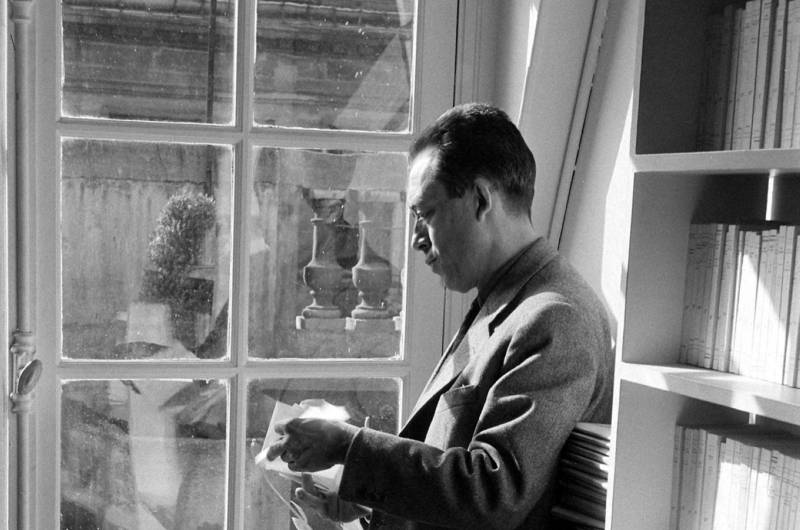
“The only hope was that the outbreak would die a natural death; it certainly wouldn’t be arrested by the measures the authorities had so far devised.”
My introduction to Albert Camus’s book "The Plague" happened during our own lockdown (of sorts) in Islamabad. My father gave me his copy to read, and little did I know how I’d come to appreciate the profound yet simple way Camus expresses turmoil from within and outside. I appreciate a writer’s ability to express their ideas and story in a way that does not seem cumbersome especially when it has to do with a heavy topic like the plague or an epidemic like cholera. This is where "The Plague" and the previous book from our book club reading, “Love In The Time Of Cholera,” differed amongst a number of aspects. Camus candid lucid style appeals to my sensibility more than a showy display of magical realism.
The Plague appears deceptively simple, and the best thing about it is that it is but you know while reading it you are encountering numerous layers within layers that speak to all your senses through various literary devices. Oran, where the story is set, is a non descript French port city in Algeria in the 1940s. Sophia’s insight: Camus ingeniously juxtaposes the frailty of human life against the mighty permanence of the sea which has witnessed many disasters in human history but still rolls on.
Camus eloquently uses the term “abstractions” to show the different reactions and responses of the characters. The main protagonist, Dr. Bernard Rieux, makes it his mission to save as many lives based on humanist principles. His work is about decency, not about being heroic. I love that philosophy is woven into a beautiful piece of realistic literature. “The brief, intermittent sibilance of a machine-saw came from a near-by workshop. Rieux pulled himself together. There lay certitude; there, in the daily round. All the rest hung on mere threads and trivial contingencies; you couldn’t waste your time on it.”
One finds parallels between the citizens in Oran and our own Pakistanis towards the spread of the COVID-19 pandemic. Initially, the knee jerk reaction by authorities and some citizens is to deny the seriousness of the situation. “Everybody knows that pestilences have a way of recurring in the world; yet somehow we find it hard to believe in ones that crash down on our heads from a blue sky.”
Oran could be Islamabad not because they both have small populations but even after a lockdown “they hadn’t yet reached the stage when plague would seem to them the very tissue of their existence.” The rhythm of the writing is deliberately slow paced to build up tension and the inertia in people comprehension of the disease. As Camus wisely observes, “The evil that is in the world always comes out of ignorance, and good intentions may do as much harm as malevolence if they lack understanding.” People may be more good than bad, but their ignorance has devastating consequences.
Camus in his realistic style makes it a point to show that not everyone reacts with panic to the situation. Cottard’s character more than welcomes the isolation the scourge brings upon Oran. It helps shields him from being caught by the law as they lie low to avoid getting infected. “What’s more, the plague suits me quite well, and I see no reason why I should bother about trying to stop it.”
Time also influences one’s views towards a pandemic. Camus refers to those who lived between World War 1 and World II, did not have much time to dwell and record the crisis as they had a war to deal with before the plague and after the plague was over. “But what are a hundred millions deaths? When one has served in a war, one hardly knows what a dead man is, after a while.” History and perspective are key when viewing a situation.
Camus's preference for animals over people is hinted at when Anjum observes that the first signs of back to normalcy is when a cat reappears on the street, and then a dog is sighted somewhere.
Another such parallel has a bit of dark humor in there somewhere that I love. “The really remarkable thing, was the way in which, in the very midst of catastrophe, offices could go on functioning serenely, and take initiatives of no immediate relevance, and often unknown to the highest authority, purely and simply because they had been created originally for this purpose.” Like in reality, it is individual doctors like Rieux, health workers like Rembard and Tarrou who are the doers determined not to surrender.
The eerie reminder that pandemics have been a part of human history,“it can lie dormant for years and years in furniture and linen-chests; that it bides its time in bedrooms, cellars, trunks and bookshelves,” accompanied by a sense of self exile and isolation compound the situation. “Moreover, in this extremity of solitude none could count on any help from his neighbor; each had to bear the load of his troubles alone.” This is the case in Oran but not so much in Pakistan fortunately.
If we can look at the positive side, for the first time in our lifetime, the world has a common challenge aside from climate change. “No longer were there individual destinies; only a collective destiny, made of plague and the emotions shared by all.” Ironically, it has taken a virus to bring almost everyone on the same page.
